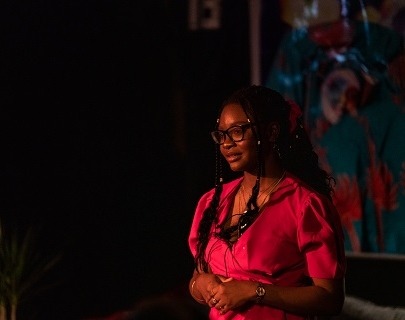Identity and impact: A review of ‘An Evening with Verse Writer’
I wasn’t sure what to expect of Lanaire Aderemi’s an evening with verse writer. I’ve been to spoken word events and performances that work with a variety of mediums, but I find they can fluctuate massively in quality. It’s safe to say that an evening with verse writer encompasses what makes spoken word and multimedium performances so impactful.
The primary element of the performance is, of course, Aderemi’s spoken word poetry, which was beautifully crafted. An evening with verse writer is inspired by the timeless words of Audre Lorde’s “your silence will not protect you” and follows Aderemi’s childhood through poems that interweave misremembering, loss and black women’s resistance across the world.
There was a continuous cyclical feel throughout the performance, with words and phrases repeated just when you thought she had moved onto the next piece. Aderemi’s emphasis on certain words and phrases only added to the earnestness of her work, which was superbly effective in the context of the piece. For example, her thrusting away the stereotypes of an angry, loud, black woman through intensifying her own tone made a powerful – if not slightly overused – statement. Despite this more generic choice, it did work well thanks to other aspects of the performance.
I actually found many of the themes within the poetry transcended culture
Furthermore, the use of dancer Cassylda Augusto-Roderigues to portray various characters in her story, as well as her younger self, was delightful. It was interesting to see the parallel between the portrayal of the girl Aderemi once was, and her now as a woman, especially as her first poem was titled ‘Mirrors and Journals’. This idea of reflection added to the cyclical feel and the themes of childhood and growing up, as well as story-telling and retelling the narrative of a black woman. This worked especially well, as the poetry itself encompasses Aderemi taking back her own narrative through the performance. She names herself as ‘verse writer’ at the beginning and end of the piece, determining and solidifying her identity for herself.
Although Aderemi occasionally stumbled on her words, the quality of the poetry itself held everything together and those slips almost made the performance feel more personal, like a conversation with a sister. However, during one scene between Aderemi and Augusto-Rodrigues, where they are an Auntie and Aderemi’s past self respectively, her noticeable reading of the script was off-putting and ruined the intimacy of the moment.
Since the performance is based off her personal experience as a black woman, there were moments that I couldn’t relate to culturally. Yet, I didn’t feel that I needed to and her use of audience participation created a causal and comfortable environment for anyone to enjoy her stories. I actually found many of the themes within the poetry such as the mother-daughter and female empowerment elements of the piece transcended culture.
It is clear that everyone involved deserved the final applause
Whilst Aderemi’s poetry was impactful, it was the combination of all the mediums that really made this performance. The lighting helped to enhance the mood of each section of poetry. The most dramatic and potent moment of the piece utilised a single spotlight on Aderemi and other moments used a variation of cool and warm lighting. The warm lighting created a familial and comforting atmosphere when discussing childhood memories, which worked well.
The set (Jade Adeyemi) was incredible. Somewhat simplistic but with an incredibly organic feel, Arderemi tells the audience it’s filled with her favourite things. The floating artwork, the plants, the books and sheets of paper scattered on a coffee table; these all give the impression that we’re inside her bedroom, her mind. The smaller, more intimate Warwick Arts Centre Studio was perfect for the more personal and causal context of the piece. It all seems apt, as she wrote this very performance in her room – this is her creative safe space and she’s letting us all inside.
What I felt was the best part of the performance, enhancing Aderemi’s words the most, was the band. Singer Simi Awoniyi was particularly spectacular in her rendition of ‘A Change is Gonna Come’ by Sam Cooke and although he played less frequently than others, saxophonist Koye Adeniyi stood out during his solo moments. The band themselves were incredible and worked well to reinforce and complement Aderemi’s words, as well as stand out in their own right. The only thing that felt too causal, even in this particular piece, was Aderemi’s unnecessary talking to the band. Although it didn’t happen that often, it did disrupt the mood created by her poetry. Other than that, it was lovely to see that when the band were the focal point, Aderemi also gave them the attention and respect they deserved.
Although an evening with verse writer is primarily advertised as all about Aderemi, I was pleasantly surprised by the culmination of so many talented people. It is clear that everyone involved deserved the final applause and, with a few minor changes, they should consider taking this piece further.

Comments